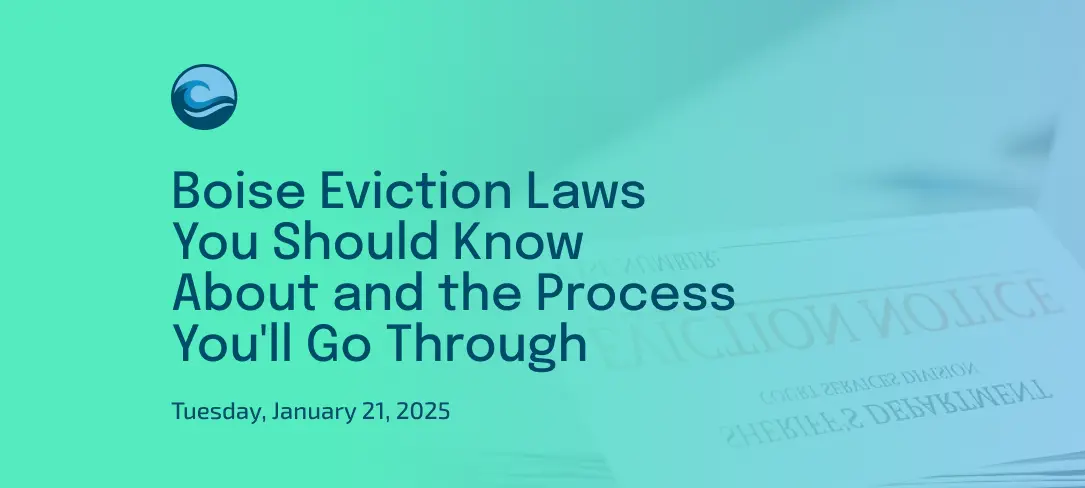Eviction processes aren't easy to navigate since they take a lot of time and effort, not to mention the laws you have to abide by to prevent an eviction lawsuit. If you intend to navigate the process on your own as the landlord, here are the Boise eviction laws you should know about and follow.
Eviction Laws and Procedures Boise Landlords Should Know
Grounds for Eviction
Idaho law allows for several grounds for eviction, a lot of which are for tenants violating the lease agreement. Knowing which tenant actions are bad enough to initiate the eviction process is important, as drastic measures for minor lease violations can appear retaliatory. The acceptable grounds for Idaho evictions are:
Non-payment of Rent: Failure to pay rent is among the most common reasons for evictions. If the tenant fails to settle the unpaid rent after the grace period and other measures taken, it's enough to start the eviction process in Idaho.
Major Lease Violations: Minor lease violations like noise complaints can be resolved by communicating with the tenant, but some are considered bad enough that a landlord can immediately issue an eviction notice such as major damage to the rental property.
Non-Renewal of the Lease: When a lease agreement comes to it’s end, the tenant will have to renew the lease to remain in the rental unit. If the tenant becomes a holdover tenant, the property owner can provide a 30-day written notice giving the resident proper notice to move out.
Illegal Activity: The notice period is shorter for tenants who conduct illegal activity. Idaho eviction laws state that landlords can file a three-day notice to comply. If the tenant refuses to vacate the property immediately, you may proceed with a forcible entry via law enforcement or an unlawful detainer suit.
What The Eviction Notice Should Include
The eviction process starts with a written notice sent to the tenant. However, it cannot simply state that the resident needs to move out. There are crucial details that you should include, or it might affect the pace of the eviction proceedings. It should have:
- Name of the tenant
- Address of the rental property
- Reason for eviction (nonpayment of rent, violation of terms, illegal activity)
- Amount of rent owed (for nonpayment of rent)
- Deadline for vacating the premises
- Landlord's contact information
Where to File a Legal Complaint
When a landlord files a complaint, they need to head to the district court where the leased property belongs and fill out the needed forms. There will be fees to pay, which are not included in court costs. Keep in mind that this can only be filed after the written notice has reached the stated deadline.
Idaho Eviction Process
Provide a Written Notice
As mentioned above, the written eviction notice should contain all the necessary information before you send it to the tenant, since you need it to start a legal eviction process in Idaho and other states. The notice period can be used for vacating the property or fixing the issue, depending on the circumstances.
Issue a Notice to Comply
The actual eviction process in court cannot begin until the landlord issues a notice to comply. You can hire a lawyer or a property manager to create the notice to ensure that you do it by the rules, or you can pay a small fee to use a step-by-step wizard online that streamlines the process and guides you through it.
Serve the Tenant
Once you have filled out and gathered the necessary court documents for a standard eviction process, you can serve the Summon and Complaint to the tenant. The court date for the trial must be stated, along with the time. You can deliver the notice personally, give it to someone over 18 in the rental unit, or mail it.
Tenant Response
The tenant needs to file a written answer before they can appear at the court trial. If the tenant contests the eviction case, they will have 21 days to explain why they did so. The lack of response from the tenant can lead to a default judgment benefiting the landlord. This does not apply to particular grounds such as squatting and illegal drug activity.
Waiting for a Court Hearing Date
The eviction hearing can take a while to be determined since you have to wait for the tenant's response. Once it arrives, both the landlord and the tenant can show evidence to support their case. This includes the lease agreement, rent payment records, statements from witnesses, and more. If the landlord fails to attend, the case will be dismissed.
Outcome
If the court rules in favor of the rental owner, a Writ of Restitution will be issued. It's a court order needed to legally evict a tenant. If the tenant still refuses to leave, the landlord can ask a law enforcement officer to escort the resident out. However, only the sheriff can remove the tenant's belongings.
Eviction FAQs
What are the tenant eviction rights I should know about?
In an Idaho eviction process, a tenant has the right to notice, right to due process, and right to legal counsel. Even upon filing the eviction lawsuit, you can still refer Idaho legal aid services to the tenant.
Can a landlord handle eviction on their own?
Yes, as long as they are familiar with Idaho law as well as general landlord-tenant laws they have to follow for legal compliance. Consulting experts in legal procedures is still recommended to avoid any trouble and ensure a smooth eviction process.
How can landlords prevent evictions?
Between the tedious process and court fees, it's always better to avoid eviction than to use it as a consequence. A landlord can take preventive measures such as conducting thorough tenant screening and writing a comprehensive rental agreement, but that still doesn't guarantee the prevention of eviction action.
Let a Property Manager Help You
Property managers aren't just suited to handle the day-to-day operations of a rental business. They are also equipped with the right expertise and resources to handle an eviction when needed.
Wave Property Management can sign and serve in your name and take care of everything that comes after. To learn more about our services, you can contact us now and we can help you improve your rental business.



